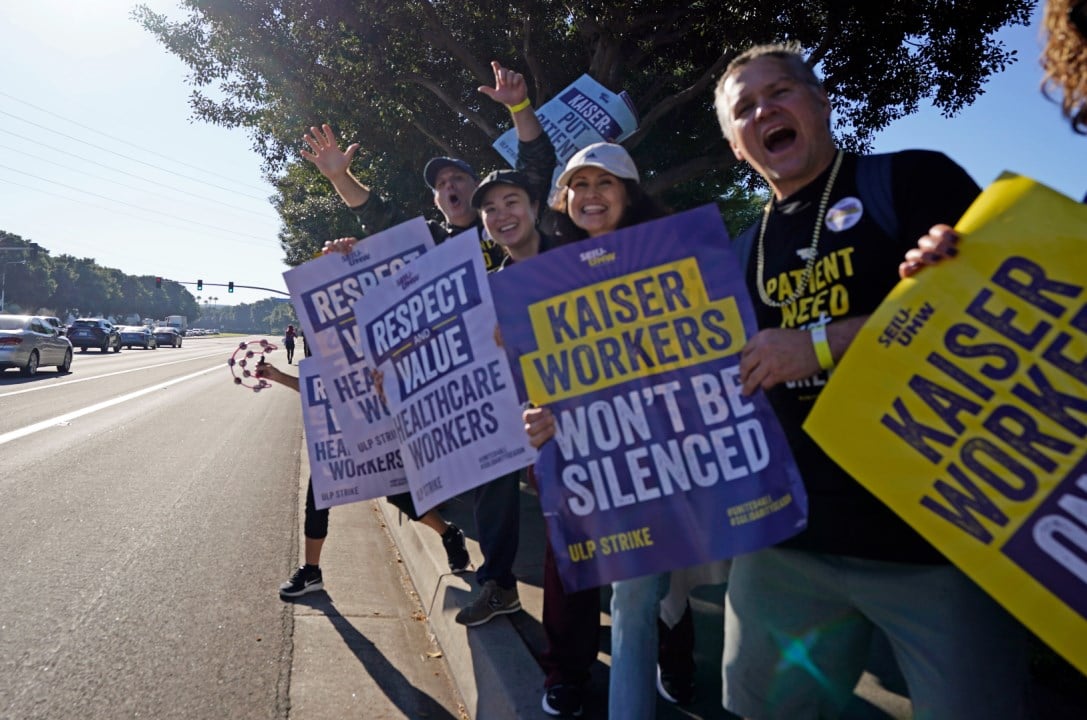Biggest US health care strike starts as Kaiser workers walk out
The Union alleges that Kaiser made unacceptable demands during contract negotiations. These demands included cutting bonuses for frontline healthcare workers while providing them to executives, a refusal to raise wages to match rising inflation, and a failure to address significant understaffing issues.
-

Kaiser Permanente workers picket Wednesday, Oct. 4, 2023, in Irvine, California, US (AP)
Tens of thousands of workers at US healthcare giant Kaiser Permanente launched their strike on Wednesday - marking the largest healthcare strike in US history - which comes amid waning contract negotiations.
The Coalition of Kaiser Permanente Unions, which represents almost 85,000 of the health system’s employees, approved a three-day strike in the states of California, Colorado, Oregon, and Washington, and only a one-day strike in Virginia and Washington, DC.
This strike represents around 35% of the company's workforce, which consists of 213,000 employees who are not physicians but include vocational nurses; techs from emergency rooms, radiology, ultrasound, respiratory therapy, surgery, and x-ray departments, certified nursing assistants, dietary services, behavioral health workers, and pharmacy technicians.
Mikki Fletchall, a licensed vocational nurse and Kaiser employee from California, told national media: “They’re not listening to the frontline health care workers,” adding that “we’re striking because of our patients.”
Read next: The ‘pink tax’ costs US women thousands of dollars: Reports
The union claims that Kaiser demonstrated unacceptable demands in the contract negotiations, which entailed bonus cuts for frontline healthcare workers while providing bonuses to executives, not willing to raise wages to match rising inflation, offering little pay for entry-level positions not competitive with service industry jobs; and not addressing major understaffing issues.
Kaiser has also been accused of leaning into subcontracting to circumvent unionized workers who are already burnt out.
IT'S HAPPENING: The Kaiser Permanente strike is ON, making today the biggest healthcare strike in American history.
— Dripped Out Trade Unionists (@UnionDrip) October 4, 2023
This is the scene as workers walk in Orange County, CA as workers walk off in Anaheim!@AboutKP: wake up. #United4All #SolidaritySeason #ISupportKaiserWorkers pic.twitter.com/FYyULPaFk5
'For the dollars we bring in'
The president of Kaiser Foundation Health Plan and Hospitals of Southern California and Hawaii, Michelle Gaskill-Hames, told national media that Kaiser still maintains a better worker retention rate than competitors.
“Our focus, for the dollars that we bring in, are to keep them invested in value-based care,” she said, adding: “I think coming out of the pandemic, health care workers have been completely burned out. The trauma that was felt caring for so many COVID patients, and patients that died, was just difficult.”
According to data from the US Centers for Disease Control and Prevention (CDC), frontline healthcare workers experienced the highest death rate during the COVID-19 pandemic, closely followed by food service workers. Both groups were classified as "essential workers" during the lockdowns and were exempt from the restrictions that required everyone else to stay at home to slow the spread of the virus.
Read more: 'Long Covid': Black women in the US bear the weight of medical racism
Just recently, around 53,000 hospitality workers in the state of Nevada voted to authorize a strike, which comes amid US President Joe Biden calling himself the “most pro-labor president” in US history.
That proves contradictory as Biden joined United Auto Workers members recently, but last year he approved legislative action to prevent railway workers from striking for better safety conditions, and weeks later, the East Palestine train derailment happened that caused a chemical spill compared to the Chernobyl disaster in 1986.

 3 Min Read
3 Min Read








